Critique of the relevance and suitability of hard or soft approach in highlighting issues faced by Harrods
Harrods has unique and very positive brand values that have enabled it to attract many clients and operate very effectively thus gaining a competitive edge across the globe. By equipping its employees with unique yet very relevant and timely skills, Harrods has managed to propel itself to greater success levels.
The company has built a strong brand and reputation level due to its competitive operational mechanisms. By providing development and growth avenues for employees, it is evident that the company has successfully used relevant hard and soft approaches on the management of the needs of its clients.
The soft approach has a lot of relevance to the organization since it is more focused on retaining employees, enhancing long term sustainability of the organization and meeting any emerging business opportunities in the retail market (Armson & Ison, 2003). By continually training and developing its employees and offering good payment packages, Harrods uses a soft approach in the management of its employees and in ensuring that the overall wellbeing of its employees is enhanced. (Campbell, 2000).
There exist an element of hard approach in the manner in which the organization focuses on recruiting employees with the needed expertise. As a weakness, it is highly likely that the company accords little attention to the needs and emerging demands of customers by instead focusing so much on addressing the needs of employees. Some of the standards that need to be maintained are very complex and challenging to the business environment (Moores & Gregory, 2000).
Though important, this has the risk of a business enterprise not identifying the demands of clients. The danger of employees being redundant through constant demand for new operational strategies could lead to excessive spending on innovation and creativity on concepts that may not enhance the competitiveness of the organization. The elements of the hard employee management approach put a lot of pressure on the employees to perform and excel in their endeavours.
Application of the soft systems method to Harrods’s situation case
The soft system method has been known to enhance a high level of efficiency and cost effectiveness in the modern business environment. It also ensures that the needs of employees and other stakeholders are catered for. Existence of a clear career path is a vital aspect that relates to the soft system method of business operations.
Besides boosting the morale of employees, it also ensures that the demands of stakeholders are addressed and that employees remain competitive while undertaking their duties and responsibilities. Good payment of employees is crucial.
By implementing very competitive remuneration standards that are in line with the soft systems method, it is worthwhile to note that employees’ performance would be enhanced by the fact that their needs and financial challenges would be catered for. Mechanisms of enhancing efficiency in business operations with well defined career paths remain crucial to the overall wellbeing of the organization.
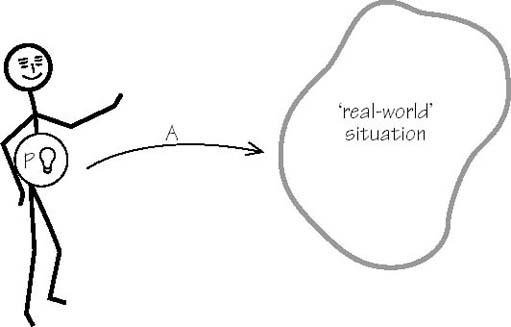
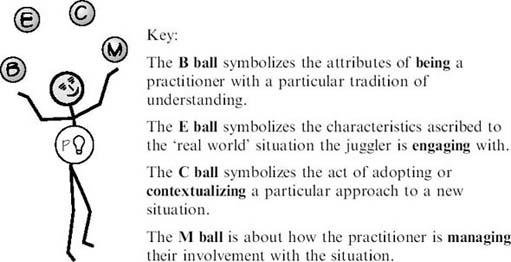
Engagement with the real Harrods business processes and conceptualisation of all business processes are important to the success of Harrods. To effectively incorporate different issues (balls as in the above diagram) constant practice, being skilful as is the case with Harrods’ employees, understanding one’s strengths, workplace weaknesses, existing and emerging business opportunities, possible threats to the success of business processes and activities are also vital elements of the success of Harrods.
In line with the BECM model, understanding employees’ unique attributes is a fundamental aspect of organisational operations. Being active and ready to participate in the understanding of human activity, integrating and balancing different job and work activities, contextualising business processes and effective management of business processes are crucial concepts that relate the management of different complex situations.
Research is an important aspect of enhancing business operations. In line with the demands and approaches of the soft systems method, Harrods has remained competitive in its efforts towards improving business operations. Such an approach is crucial as it enhances proper planning and execution of business processes.
Harrods basically engages the specific condition of the problem, articulates the condition of the problem, formulates the core definition and works towards understanding the relevant and timely systems in which the problem manifests itself. Proper human resource management strategies remain to be fundamental to the success of most business endeavours.
It is evident from the case that integration of various human resource practices has been critical in enhancing the overall success of Harrods and improving its competitiveness. According to Moeller (2007), the concept of the classic inquiry which has several key stages is of great importance to the success of business operations. The model not only shapes the manner in which business operations are undertaken but also helps to underpin the value, significance and relevance of employees to the overall success of a business enterprise.
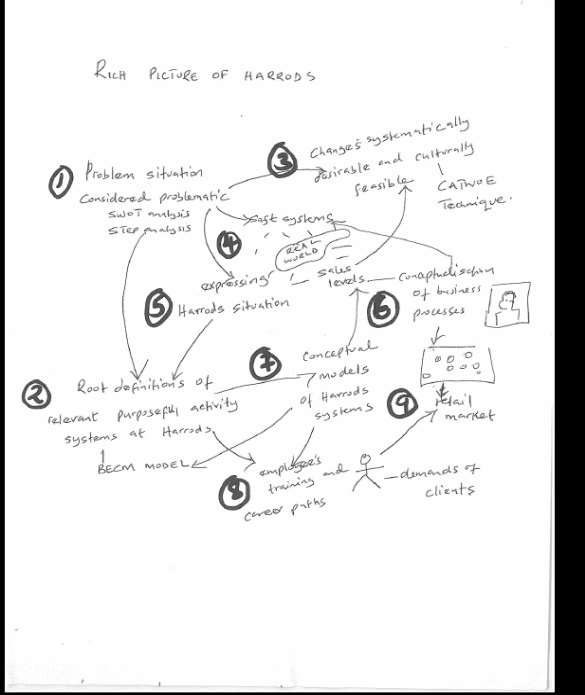
As outlined in the above diagram and process flowchart, it is evident that employees’ training and career path development strategies are crucial as they encourage career development. According to Andrew & Andrew (2008), this business strategy offers the employees’ opportunities for growth aimed at enhancing the common good of all stakeholders.
Putting pressure on the clients boosts product demand and sales levels and also offers new development and business opportunities to the clients. With reference to the activities at Harrods, the first activities of the operations are to acknowledge the challenges and limitations of the undertakings at Harrods.
This approach helps to identify any possible challenges faced by clients. Definition of the problem at hand, conceptualizing employees’ needs, conducting comparisons of the modality of operations and undertaking desirable changes are of essence to the organization. This is evidenced by the fact that Harrods as an organization has clear career paths for all employees at all levels, a concept that enhances constant growth and development of opportunities (Davis, 2006).
Research on the unstructured difficult situation

With reference to Harrods case, this stage entails finding out any possible information that relates to the situation of the problem and circumstances in question. It is vital to conduct research and critically assess the manner in which business operations are undetaken. Many difficult situations do exist.
Expressing the situation of the problem
This stage involves drawing of effective and unique rich images that outline the problem and its relationship to the overall business organization. This is a crucial aspect of the whole process as it ensures that one fully understands business processes in a diagrammatical manner (Armson & Ison, 2003).
Understanding of the situation of the problem would involve focusing on the structures, business processes, climate of the business environment, human resources and establishing conflict resolution mechanisms. In the case study, Harrods’ management should be focused on identifying any loopholes that could hinder greater success at Harrods’ retail stores.
Definition of roots
According to Stewart (2010), definition of roots entails undertaking an in-depth definition and description of all relevant human activities and issues that face the organization. The CATWOE technique is very relevant at this point as it would help the broader business management to identify any potential challenges that could otherwise hinder the efficient operation of the business. It could also involve identifying issues that could lead to lack of efficiency in the organization.
The mnemonic CATWOE technique is used to clearly outline and elaborate business activities that illustrate the manner in which clients, transformation, suppliers, stakeholders and business processes interrelate. The use of rich picture encourages a business process approach. Diagrammatic representation of business operations facilitates better understanding of business endeavours (Samuelson, 1983).
Harrods definition of relevant, more appropriate and purposeful business activities and systems
Mapping of the conceptual framework
This involves preparing for a logical model of the major business activities in order to fully satisfy the core definition of the concept of soft approach in human resource operations and other business management undertakings.In the case of Harrods, this step could be equated to the identification of possible challenges that the market faced and seeking to identify means through which such challenges could be addressed.
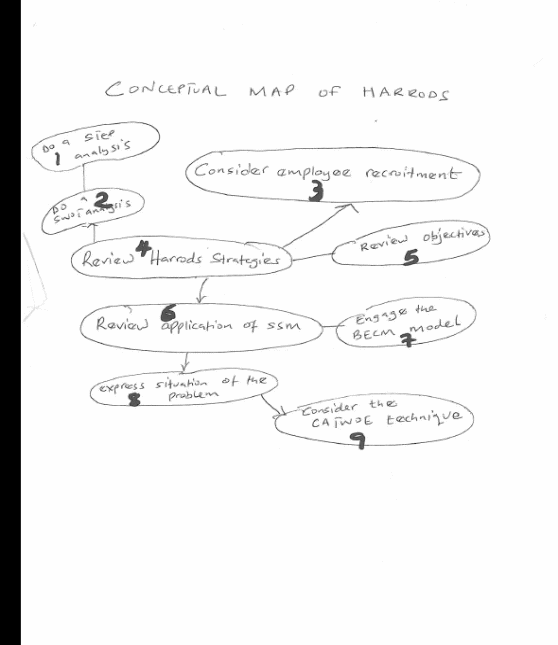
Comparison of conceptual models with the truth on the ground
Though not very easy to practise, this aspect of soft approach to business entails planning, organising business processes and streamlining business processes in line with the actual business processes. It is often crucial to undertake thorough business comparisons of the reality on the ground with the aim of ensuring that the overall business success is efficiently and cost effectively realised.
Activities which if implemented would transform the organization for the better are addressed at this point. As shown in the diagram below, indication of both dependent and independent such as Harrods employee training and employee performance helps to promote employees’ better understanding of the operations of the business and related pertinent activities.
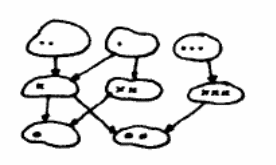
Seeking and implementing reasonable and desirable change
According to Davies and Ledington (1991), this process involves undertaking thorough analysis of the suggested changes that need to be implemented. This process is critical as it helps to recognise the critical issues necesary to ensure that Harrods business processes are effective and realistic. At Harrods, the desired change could be in form of identifying mechanisms needed to improve the level of employees’ productivity through the enhancement of efficiency and cost effectiveness.
Steps to improve the situation of the problem using SWOT AND STEP analyses
In any given business environment, problems can always emerge. It is crucial for business managers at Harrods to used both STEP and SWOT analyses so as to identify the strengths, weaknesses, business opportunities, and threats to identify possible challenges and solutions which if implemented, would result in a greater level of efficiency, productivity and cost effectiveness.
Application of the SSM at Harrods is a major strength as it would enhance a better understanding of different challenges and seeking the best possible solutions to the same. As a weakness, such moves end up compelling the top level managers at Harrods to adopt very unrealistic and unproductive solutions that do not fully address the needs of the organisation.
At Harrods, major business strengths that boost business operations and employee efficiency include having a high sense of good publicity and enforcing effective communication. Harrods also has a potency of the existence of very reliable and fair remuneration structure with a clear path of employee promotion that encourages hard work, loyalty, and commitment among employees. Others include having very clear recruitment strategies and boosting efficiency competence in line with business processes.
On the other hand, the ever increasing demand for better and more competitive services offer Harrods an opportunity to expand in its provision for more competitive products in the market. As a soft system approach, Harrods has managed to constantly adhere to the ever challenging circumstances and demands of both clients and employees among other key stakeholders (Samuelson, 1983).
It has been widely proved that diversification of business processes is key to the success of business operations. In line with the explanation of both Amber and Sabrina, Harrods’ business practices have the strength of not only being customer oriented but also focused on enhancing constant employee growth and a high sense of creativity and innovativeness (Moeller, 2007).
As a weakness, Harrods has a major weakness of investing too much in employees while ignoring research of business competition activities. This makes the company to be very vulnerable to any possible malpractices and malicious activities undertaken by the competitors.
It therefore follows that both the SWOT analysis approach and the SSM framework are means of identifying possible challenges faced and the best means of addressing the same by use of the STEP model of solving problems, encouraging learning among employees and building a competitive edge within the competition (Davies and Ledington, 1991).
Sadly, Harrods is faced with the threat of incurring a lot of expenditure on the training of employees who may not have a long term goal and interest in the operations of the company. Moreover, the fact that the organizational appraisal system at Harrods is more focused on addressing the company’s need to identify and fulfil employees’ needs could be detrimental to the overall success of the company.
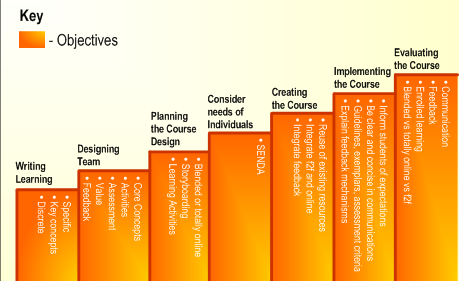
STEP model as applied at Harrods
Recommendations
Proper planning and integration of all business processes should be undertaken in a business enterprise. At Harrods, it is crucial to have a streamlined business operational strategy that would not only address the demands of clients but also foster employees’ ability to achieve the set smart targets. In most instances, business organizations should not be focused on understanding the salient, physical and invisible issues but rather be broadened to a range of symbols and definitions of the actual business framework.
Further suitable approaches
Besides the use of the CATWOE technique, rich pictures and the application of both soft and hard business approaches, a number of strategies do exist. Business process maps are vital mechanisms of addressing new business challenges and projecting possible future business operations.
On a business process map, the workflow pattern is easily viewed and any loopholes and challenges that could otherwise hinder effectiveness are clearly identified and addressed (Andrew & Andrew, 2008). The techniques of business process alignment and process mapping allow an individual to have a hint of the crucial details of a business process in a unique manner that can never be undertaken using textual theoretical explanations.
Business process mapping is relevant as it can help personnel to foster a shared conceptualization of the business process and hence be more willing to participate in the initiation and implementation of change programs (Palmer & Dunford, 1996). As Armson and Ison (2003) explain, it is much easier for a human resource department of an organization to conduct employee training in cases where visual training mechanisms are employed.
This approach has the unmatched benefit of facilitating the effective identification of system applications that are used by organizations. The discussed alternative suitable approaches are fundamental in the management of business processes and enhancement t of a sense of efficiency and cost effectiveness (Davies & Ledington, 1991).
Moreover, though many approaches do exist, it is evident that most techniques used are very costly while others tend to be irrelevant to certain business processes and situations. This implies that the success of certain business approaches is dependent on the level of scrutiny and proper planning undertaken before the actual implementation of the approach is done.
Customisation of approaches is also a fundamental process that should be put into consideration and effectively formulated with the view to enhance organisational performance and the overall wellbeing and common good of all stakeholders.
References
Andrew, C & Andrew, S 2008, The Foundations of Positive and Normative Economics, Oxford University Press, Oxford.
Armson, R & Ison, R 2003, Juggeling with complexity: searching for a system, Springer Publishers, The Open University.
Davies, L & Ledington, P 1991, Information in action: soft systems methodology, Basingstoke, Macmillan, Hampshire.
Davis, J 2006, “Heterodox Economics, the Fragmentation of the Mainstream, and Embedded Individual Analysis”, in Future Directions in Heterodox Economics, University of Michigan Press, Michigan.
Moeller, R 2007, COSO Enterprise Risk Management: Understanding the New Integrated ERM Framework, John Wiley Sons Inc, New Jersey.
Samuelson, P 1983, Foundations of Economic Analysis, Enlarged Edition, Harvard University Press, Boston.
Stewart, M 2010, The Management Myth: Debunking Modern Business Philosophy, W. W. Norton Limited, London.